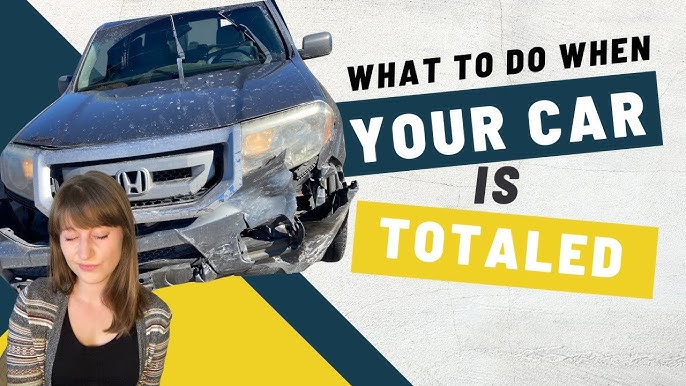If your car is totaled, it basically means your insurance company thinks it’s not worth fixing. Instead of paying for repairs, they’ll just give you money for what your car was worth right before the accident. Sometimes, it’s not just the damage that makes a car a total loss; it could also be things like the deployment of the airbags, which can be expensive to replace.
Insurance companies usually have a rule for this. If fixing your car would cost around 75% or more of its value, they call it a total loss. Even if the car could be repaired, they might decide it’s not worth it. The amount they say your car is worth (called the actual cash value or ACV) is often less than what you paid for it, especially if it was used.
If you still owe money on the car, the insurance company will use the payout to pay off your loan first. If there’s anything left over, you’ll get it. But if the payout isn’t enough to cover your loan, you might have to pay the rest yourself.
Here is what happens if your car is totaled.
Coverage Assessment
If your car is totaled, your insurance company decides how much to pay based on your coverage. If you have collision or comprehensive insurance, they’ll pay the actual cash value (ACV) of your car what it was worth before the accident, not what you paid for it.
If someone else caused the crash, their insurance should cover it, but if they don’t have enough coverage, you’ll need uninsured/underinsured motorist protection.
If you still owe money on the car, the payout goes to your lender first. If it’s not enough to cover your loan, you have to pay the rest unless you have gap insurance, which covers the difference.
Your insurer will tell you how much they’re offering, and while you can try to negotiate, they usually stick to their valuation.
Loan Payoff
If your car is totaled and you still owe money on it, things can get tricky. Your insurance company will pay out the car’s actual cash value (ACV), but that money doesn’t go straight to you it goes to your lender first.
If the payout covers your entire loan, great. The loan is paid off, and if there’s anything left over, you get the extra cash. But if the payout isn’t enough to cover what you still owe, you’re stuck paying the rest out of your pocket. This can happen if your car loses value quickly or if you have a long loan with little equity in the car.
That’s where gap insurance can help. If you have it, it covers the difference between what your insurance pays and what you still owe, so you’re not left paying for a car you no longer have. If you don’t have gap insurance, you’ll have to come up with the rest yourself.
Payout
When your car is totaled, your insurance company pays you what it was worth right before the accident, not what you originally paid for it. This amount is called the actual cash value (ACV), and it’s usually lower than the purchase price because cars lose value over time.
If you fully own the car, the money goes straight to you. But if you still owe on a loan, the insurance company sends the payout to your lender first. If the payout is more than what you owe, you get to keep the extra cash. If it’s less, you still have to pay the remaining balance unless you have gap insurance, which covers the difference.
If you think the payout is too low, you can try to negotiate by showing proof that your car was worth more, like recent repairs or similar car listings.
Replacement
If your car is totaled, replacing it depends on your insurance and finances. If you have replacement coverage, your insurer might pay for a similar car or even a brand-new one. But most policies only pay the actual cash value (ACV), which is what your car was worth right before the accident. Since cars lose value fast, this payout might not be enough to buy the same car again.
If you still have money on a loan, the insurance money goes to your lender first. If the payout is more than what you owe, you get the extra cash. If it’s not enough to cover your loan, you have to pay the remaining balance unless you have gap insurance, which covers the difference.
If the payout isn’t enough to buy another car outright, you may need to finance one or look for a cheaper option.
